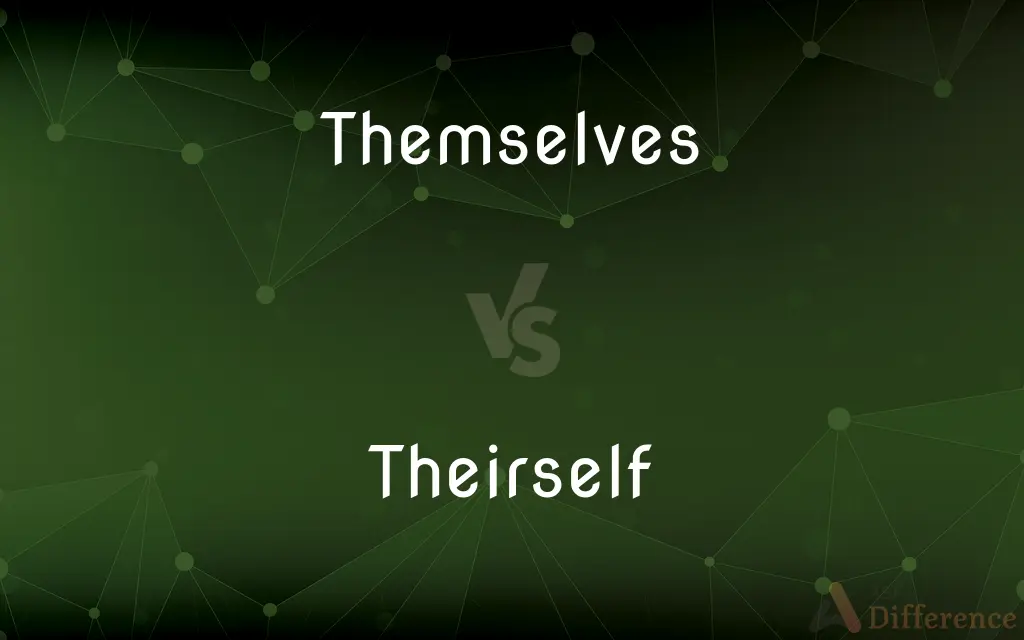Themselves vs. Theirself — What's the Difference?
By Maham Liaqat & Urooj Arif — Updated on April 27, 2024
"Themselves" is the standard reflexive and emphatic pronoun for plural antecedents, widely accepted in formal and informal contexts. "Theirself," although historically present, is often used to refer to a singular non-binary individual, gaining acceptance

Difference Between Themselves and Theirself
Table of Contents
ADVERTISEMENT
Key Differences
"Themselves" is traditionally used as a reflexive pronoun referring to a group of people or things, ensuring grammatical coherence when the subject of the sentence is plural. On the other hand, "theirself" is emerging in usage as a reflexive pronoun for singular antecedents, particularly with non-binary gender references.
In formal writing and standard English, "themselves" remains the correct form when referring back to plural nouns or indefinite pronouns such as "everyone" or "somebody." Whereas "theirself" is increasingly seen in informal contexts and is recognized by some contemporary language guides as an acceptable singular reflexive pronoun.
The use of "themselves" is uncontroversial and universally accepted in both spoken and written English across various registers. In contrast, "theirself" is sometimes viewed as nonstandard but is gaining traction within communities advocating for more inclusive language practices.
"Themselves" can also be used for emphasis, as in "They did it themselves." Conversely, "theirself," while less commonly used in this way, follows a similar pattern in sentences like "They did it theirself," emphasizing the action performed independently by a single individual.
The debate over "theirself" vs. "themselves" reflects broader societal shifts towards recognizing and respecting gender diversity, with language evolving to include forms that individuals feel best represent their identities, despite traditional grammatical rules.
ADVERTISEMENT
Comparison Chart
Number Agreement
Plural
Singular
Formality
Accepted in both formal and informal contexts
Mostly informal, increasingly accepted in formal texts
Usage Context
Refers to multiple individuals or groups
Refers to a single individual, especially non-binary
Grammatical Tradition
Long-standing usage in English
Historically present, but limited, now reviving
Social Implication
Standard grammatical form
Reflects modern shifts towards gender-neutral language
Compare with Definitions
Themselves
Reflects the standard practice in reflexive pronoun usage.
The cats cleaned themselves.
Theirself
Emerging usage as a singular reflexive form, particularly for non-binary or unspecified gender.
Alex felt proud of theirself.
Themselves
Can be used for emphasis in various contexts.
They themselves are responsible for this decision.
Theirself
Reflects evolving language practices around gender neutrality.
The person believes in advocating for theirself.
Themselves
Used to refer back to the subject of the sentence when the subject is plural.
The students completed the project themselves.
Theirself
Represents a movement towards more inclusive language.
Jordan has to decide for theirself.
Themselves
Applies to plural entities acting on their own behalf.
The companies merged themselves without external advice.
Theirself
Used informally to refer to an individual performing an action alone.
Sam did the research theirself.
Themselves
Emphasizes that the action was done by the group, without outside help.
They organized the event themselves.
Theirself
Sometimes used in spoken language or informal writing.
They fixed the problem theirself.
Themselves
Themselves, previously known as Them, is an American hip hop duo based in Oakland, California. It consists of Doseone and Jel.
Theirself
(nonstandard) themself.
Themselves
(reflexive pronoun) The reflexive case of they, the third-person plural personal pronoun. The group of people, animals, or objects previously mentioned, as the object of a verb or following a preposition also used for emphasis.
Theirself
(nonstandard) themselves.
Themselves
(reflexive pronoun) The reflexive case of they, the third-person singular personal pronoun. The single person previously mentioned, as the object of a verb or following a preposition also used for emphasis.
Themselves
The plural of himself, herself, and itself. See Himself, Herself, Itself.
Common Curiosities
How do grammar purists view "theirself"?
Many traditionalists still view "theirself" as grammatically incorrect, although this perspective is slowly changing as language evolves to be more inclusive.
Can "theirself" help in avoiding gender bias?
Yes, "theirself" is part of a broader effort to use language that avoids gender bias and more accurately reflects individuals' identities.
Can "theirself" be used in formal writing?
While traditionally considered incorrect, "theirself" is starting to be recognized in more formal settings, particularly in discussions related to gender identity.
Why is "themselves" more commonly accepted than "theirself"?
"Themselves" is the traditionally correct plural reflexive pronoun, while "theirself" is a newer singular form gaining acceptance mainly in informal contexts.
What are the implications of using "theirself" in professional communications?
Using "theirself" in professional settings can be seen as progressive and inclusive, though it's important to consider the audience's familiarity and acceptance of non-traditional pronouns.
How does "themselves" function in a sentence compared to "theirself"?
"Themselves" functions as a reflexive pronoun for plural subjects, while "theirself" is used similarly but for a singular subject.
What guides the choice between "themselves" and "theirself"?
The choice often depends on the number of subjects (plural or singular) and the formality of the context, as well as the speaker's intention to reflect gender neutrality.
Is the use of "theirself" officially recognized by linguistic authorities?
Some modern dictionaries and style guides are beginning to include "theirself" as an acceptable singular reflexive pronoun, especially in contexts requiring gender-neutral language.
How should one decide whether to use "themselves" or "theirself" in writing?
Consider the number of people referred to, the context's formality, and whether using gender-neutral language is a priority.
What are some examples of sentences using "themselves" and "theirself"?
"Themselves": The children entertained themselves all afternoon. "Theirself": Taylor made the decision theirself.
Share Your Discovery

Previous Comparison
Poncho vs. Serape
Next Comparison
Flammable vs. InflammableAuthor Spotlight
Written by
Maham LiaqatCo-written by
Urooj ArifUrooj is a skilled content writer at Ask Difference, known for her exceptional ability to simplify complex topics into engaging and informative content. With a passion for research and a flair for clear, concise writing, she consistently delivers articles that resonate with our diverse audience.
















































